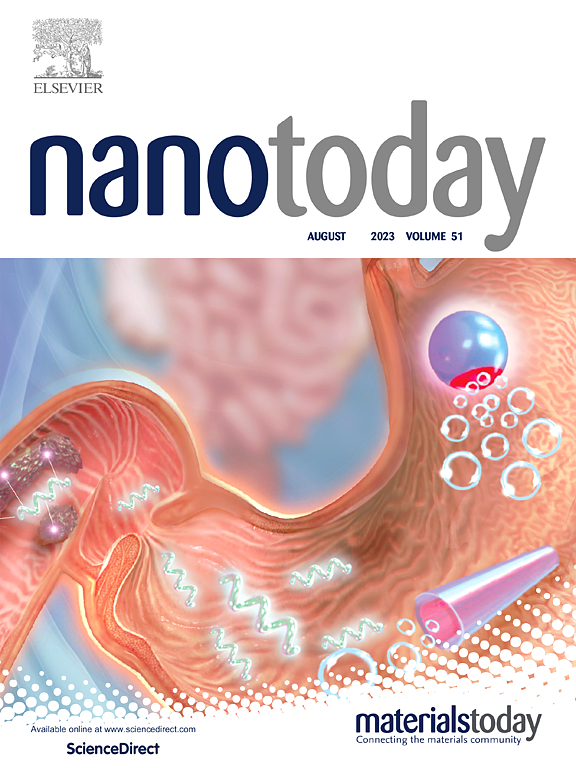Tunable multi-responsive N-heterocyclic carbene-gold nanoenzyme for tumor-specific pyroptosis and immune activation in cancer therapy
IF 13.2
1区 材料科学
Q1 CHEMISTRY, MULTIDISCIPLINARY
引用次数: 0
Abstract
Heterogeneity of the tumor microenvironment (TME) poses significant obstacles to effective tumor treatment. Pyroptosis-based immunogenic cell death (ICD) therapy is an ideal strategy to overcome TME heterogeneity and achieve a satisfactory antitumor effect. However, specific activation of pyroptosis in tumors while sparing normal tissue still remains a great challenge. Here, we have developed novel, biocompatible N-heterocyclic carbenes-gold nanoparticles (NHC@AuNPs) as TME-responsive nanoenzyme and potential pyroptosis inducers through an azide-alkyne cycloaddition “click” reaction and direct aurophilic interaction (AuI∙∙∙AuI). The NHC@AuNPs demonstrated tunable multi-responsive abilities within the TME, including superior peroxidase (POD) activity, GSH depletion through on-site cleavage Au-Au bond, inhibition of thioredoxin reductase and enhancement of ROS. This ROS buildup damages mitochondria, further enhancing H2O2 release and amplifying the catalytic cycle of ROS production. NHC ligation also exhibited enhanced fusion of NPs with the lipid bilayer, promoting high intracellular uptake in cancer cells. In vitro and in vivo experiments demonstrated that NHC@AuNPs effectively trigger pyroptosis in tumor cells through the ROS-modulated NLRP3/caspase-1/GSDMD pathway and activate antitumor immunity, such as the increased infiltration of CD4+ and CD8+ T cells, as well as the significant release of proinflammatory cytokines. These findings provide valuable insights for designing pyroptosis-inducer in cancer therapies.
可调多反应 N-杂环碳金纳米酶,用于肿瘤特异性热休克和癌症治疗中的免疫激活
肿瘤微环境(TME)的异质性是有效治疗肿瘤的重大障碍。基于热蛋白沉积的免疫性细胞死亡疗法(ICD)是克服肿瘤微环境异质性并取得满意抗肿瘤效果的理想策略。然而,如何特异性地激活肿瘤中的热蛋白沉积同时保护正常组织仍然是一个巨大的挑战。在此,我们通过叠氮-炔烃环加成 "点击 "反应和直接亲氨基作用(AuI∙∙∙AuI),开发了新型、生物相容性N-杂环碳烯-金纳米颗粒(NHC@AuNPs),作为TME响应型纳米酶和潜在的热诱变诱导剂。NHC@AuNPs在TME中表现出了可调的多反应能力,包括卓越的过氧化物酶(POD)活性、通过现场裂解Au-Au键消耗GSH、抑制硫代氧化还原酶和增强ROS。这种 ROS 的积累会破坏线粒体,进一步加强 H2O2 的释放并扩大 ROS 生成的催化循环。NHC 连接还能增强 NPs 与脂质双分子层的融合,促进癌细胞的高胞内吸收。体外和体内实验表明,NHC@AuNPs 可通过 ROS 调节的 NLRP3/aspcase-1/GSDMD 通路有效触发肿瘤细胞的热凋亡,并激活抗肿瘤免疫,如增加 CD4+ 和 CD8+ T 细胞的浸润,以及显著释放促炎细胞因子。这些发现为在癌症疗法中设计热诱变诱导剂提供了宝贵的启示。
本文章由计算机程序翻译,如有差异,请以英文原文为准。
求助全文
约1分钟内获得全文
求助全文
来源期刊

Nano Today
工程技术-材料科学:综合
CiteScore
21.50
自引率
3.40%
发文量
305
审稿时长
40 days
期刊介绍:
Nano Today is a journal dedicated to publishing influential and innovative work in the field of nanoscience and technology. It covers a wide range of subject areas including biomaterials, materials chemistry, materials science, chemistry, bioengineering, biochemistry, genetics and molecular biology, engineering, and nanotechnology. The journal considers articles that inform readers about the latest research, breakthroughs, and topical issues in these fields. It provides comprehensive coverage through a mixture of peer-reviewed articles, research news, and information on key developments. Nano Today is abstracted and indexed in Science Citation Index, Ei Compendex, Embase, Scopus, and INSPEC.
 求助内容:
求助内容: 应助结果提醒方式:
应助结果提醒方式:


